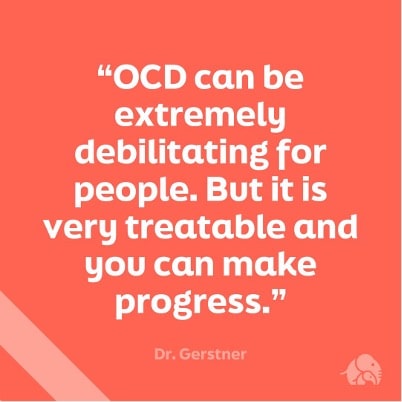When you think of Obsessive-Compulsive Disorder (OCD), what comes to mind? Maybe it’s someone who washes their hands a lot or insists everything has to be perfectly organized. Maybe you picture Mr. Monk’s quirks while he solves cases. While those can be part of it, OCD is so much more than just being neat or cautious. It’s a mental health condition that involves intrusive thoughts (obsessions) and repetitive behaviors (compulsions) that can feel like they’re taking over someone’s life.
For someone with OCD, these thoughts and habits aren’t just quirks—they’re deeply distressing and hard to control, but it is treatable. In this post, we’re diving into the most common symptoms of OCD, how they show up in daily life, and what treatment options there are out there.
This blog post is written based on an interview-style podcast episode where Miranda Barker, LICSW interviews Dr. Robyn Janssen and Dr. Justin Gerstner:
Understanding OCD: Symptoms and Misconceptions
OCD can be incredibly debilitating but is highly treatable with the right approach. OCD is a type of anxiety disorder, but in order to be diagnosed with obsessive compulsive disorder, you need to be experiencing obsessions (fears or intrusive thoughts) and compulsions (need to perform repetitive behaviors or mental acts).
What are examples or signs of OCD obsessions?
- Fear of contamination or germs
- Perfectionism
- Disturbing violent thoughts
- Intrusive sexual thoughts
- Over the top or excessive religious obsessions
- Worries about losing control (like impulsively hurting someone)
Examples of common OCD compulsions are:
- Excessive cleaning (hand washing, cleaning)
- Arranging or organizing things in a certain way
- Feeling distress if things are not ordered or organed a certain way
- Repeatedly checking locks, appliances, etc.
- Counting objects, steps, or actions
The hallmark of OCD is that these obsessions and compulsions consume significant time and interfere with daily activities, relationships, and overall quality of life. It’s important to understand that OCD is more than just oddities or “being tidy.” It’s a deeply distressing condition that requires compassion and, often, professional support.
In the interview, Miranda points out a common misconception: “OCD is often thrown around casually, but it involves more than just tidy habits; it’s a significant cycle of distress.”
How OCD Symptoms Impact Daily Life
OCD can significantly impact daily life by creating overwhelming and time-consuming routines that interfere with personal, professional, and social responsibilities. Individuals with severe OCD might spend hours performing compulsive behaviors to ease the anxiety caused by intrusive thoughts. This constant cycle of obsessions and compulsions can disrupt work performance, strain relationships, and reduce overall quality of life. Left untreated, OCD can lead to feelings of isolation, frustration, and a diminished sense of control over one’s life.
Miranda shares a time she saw a teenager for therapy that had been diagnosed with OCD. This teenager would spend hours in the bathroom in the morning, convinced that he needed to do certain acts or behaviors in a certain order (or else he would experience high anxiety). Miranda worked with this client initially on other goals and then later referred out to ERP once the OCD diagnosis was confirmed.
Using Exposure Response Prevention to Treat OCD
“Exposure response prevention is the most evidence-based treatment for OCD,” Dr. Robyn Janssen. In the interview, Dr. Janssen passionately discusses ERP, which involves guiding clients through exposures to what they fear most, with the aim of reducing anxiety over time. She describes ERP as a “cool process” that involves guiding clients through exposures while they tolerate anxiety and learn to break the cycle of compulsion .The process is structured and systematic, usually involving 12 to 20 sessions. This structured therapy has been shown to lead to symptom remission in about 70% of cases.
Additionally, CBT is often used to target unwanted thoughts and find relief from OCD symptoms.
The Role of Medication in OCD Management
Dr. Gerstner shared that medication is helpful in treating severe cases of OCD. SSRIs are the gold standard in medication, helping to manage symptoms by targeting serotonergic pathways in the brain. However, he also stresses starting with therapy due to its proven efficacy.

The Power of Family Support
“Including family support in therapy can prevent them from inadvertently reinforcing OCD behaviors.” – Dr. Janssen
The role of family support is crucial, especially in children and adolescents that are struggling with OCD. Educating family members on how to support their loved ones without enabling rituals can significantly enhance treatment outcomes.
Other Advanced Treatments and Innovations for OCD
TMS (Transcranial Magnetic Stimulation) and deep brain stimulation offer hope for resistant cases of OCD. Dr. Gerstner shares insights on how these advanced treatments are opening new avenues for patients in need of more intensive interventions. Listen to our podcast on TMS or read our blog post here.
OCD Success Stories: A Beacon of Hope
Dr. Gerstner shared an uplifting story of an adolescent client who completely turned his life around through treatment. From isolation and excessive hand-washing, the teen progressed to no longer needing medication and resuming daily activities, showcasing the transformative power of effective OCD treatment.
Listen to the whole interview and story here:
This is Hope for People with Obsessive Compulsive Disorder
Both Dr. Janssen and Dr. Gerstner reinforce the message that OCD is real but, importantly, treatable. With the right combination of therapy, medication, family support, and innovative treatments, individuals can reclaim their quality of life.
Whether you’re a therapist, someone living with OCD, or a family member supporting a loved one, this podcast provides invaluable insights and practical advice. Subscribe to The Therapist Thrival Guide for more episodes filled with expert advice and inspiring stories.
Looking for a therapist that specializes in OCD? Find an Ellie clinic near you.
For further reading on OCD treatments and family support, visit the International OCD Foundation’s website or refer to support groups like NAMI. These resources can provide additional support and education for both individuals and families affected by OCD.


